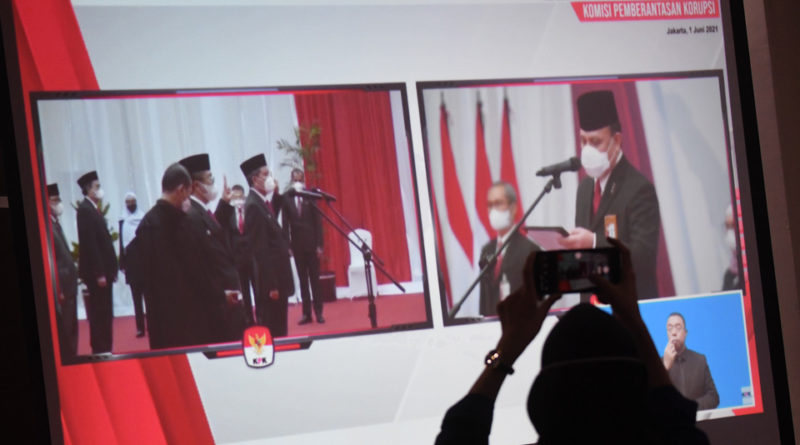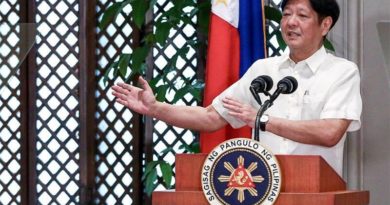HEADLINE-CORRUPTION: JAKARTA, Indonesia- Over 1,200 KPK Employees Installed as Civil Servants amid Opposition
A journalist takes a picture in front of a big screen playing swearing-in ceremony of Corruption Eradication Commission (KPK) employees in South Jakarta on June 1, 2021. (Antara Photo/Akbar Nugroho Gumay)
.
.
Jakarta. The Corruption Eradication Commission, or KPK, on Tuesday gathered 1,271 employees to take an oath of allegiance as civil servants to follow a new law which has met resistance from an element of its investigators.
The swearing-in ceremony has drawn controversy because only those passing the so-called nationalism test are eligible to become employees.
At least 75 members have failed the test, including top investigator Novel Baswedan and KPK union leader Yudi Purnomo.

Novel has earned reputation for handling high-profile cases involving ministers, high-ranking police officers and other top state officials.
Following unsuccessful police attempts to slap criminal charges on him, Novel decided to resign from the National Police and to focus on his job at the KPK.
He was the victim of the April 2017 acid attack that severely damaged his eyes. More than two years later, two active police officers handed themselves in to the police after confessing to their roles in the attack.
Yudi meanwhile is known as a staunch critic of current KPK leadership by Firli Bahuri. He has repeatedly said the nationalism test was little more than an attempt to dismiss a certain group of employees like him and Novel.

Of the 75 employees, 51 will be permanently dismissed from the KPK but it remains unclear if Novel and Yudi are among them.
The ceremony went on smoothly at the KPK headquarters in South Jakarta led by Firli.
Only 53 employees were present at the building while the rest followed the proceedings online due to Covid-19 protocols.
They swore the oath to uphold and protect state ideology Pancasila and the constitution and pledged allegiance to the government.
The ceremony was held in coincidence to the anniversary of Pancasila which now becomes a national holiday.
Hundreds of police officers and soldiers stood guard around the building to ensure the ceremony went without incident.
The transition from KPK employees to civil servants is mandated by the amended KPK law, Firli said.
Despite their new status as civil servants, KPK employees are independent from the government when doing their job, he added.
“All KPK employees must have no doubts and remain committed to eradicating corruption free from influence of any kind of power. The fight against corruption will not end until we die,” Firli said in his opening remarks.
A day before the ceremony, the 75 employees who didn’t past nationalism test sent an open letter to the KPK demanding a delay until there is assurance that all current employees will be installed as civil servants.
Apart from Yudi and Novel, other top investigators failing the nationalism test included Andre Dhedy Nainggolan, Afief Yulian Miftah, Budi Agung Nugroho, Rizka Anungnata, Budi Sokmo, Ambarita Damanik, Muhammad Praswad Nugraha, Marc Falentino, Iguh Sipurba, Harun Al Rasyid and Aulia Posteria.
They have handled high-profile corruption cases, most recently against Social Affairs Minister Juliari Batubara, Maritime Affairs and Fisheries Minister Edhy Prabowo, South Sulawesi Governor Nurdin Abdullah and General Election Commissioner Wahyu Setiawan.
Since the KPK law was amended in 2019, at least 38 KPK employees have resigned in disagreement.
.

Why is the amended law contentious?
The government and the House of Representatives agreed to amend the 2002 Law on the KPK on the grounds that the commission had been too powerful while there was a lack of an oversight body.
The move came shortly after President Joko Widodo was sworn in for his second term and triggered nationwide protests over allegations that the new law would cripple the respected anti-graft agency.
At least two students were killed during marathon rallies across the country that often erupted in violent clashes with security officials.
The amended law introduced an oversight body inside the commission, made it mandatory for all KPK staff to join the civil service and strip off the commissioners’ once wide-ranging authority to investigate and prosecute corruption cases.
KPK investigators cannot wiretap suspects without prior approval from the oversight body.
Then KPK Deputy Chairman Laode M. Syarif said at that time that dismantling the KPK commissioners’ authorities is tantamount to “killing” the anti-graft agency.
The KPK also loses its privilege as an independent state agency, because its entire staff are required to join the civil service, he said.
Furthermore, the new law creates a loophole stemming from the president-appointed oversight body that may cause troubles in the future.
The oversight body is authorized to give permits for wiretaps or asset seizures, but it’s made up of civilians who have no authority to investigate a case or prosecute suspects.
The KPK has won reputation for uncovering high-profile graft cases involving top politicians and close cronies of past presidents.
However, it often came under media scrutiny for alleged political moves. During the 2014 and 2019 presidential elections, the KPK arrested party leaders with close ties to presidential candidates when the voting date was approaching.











